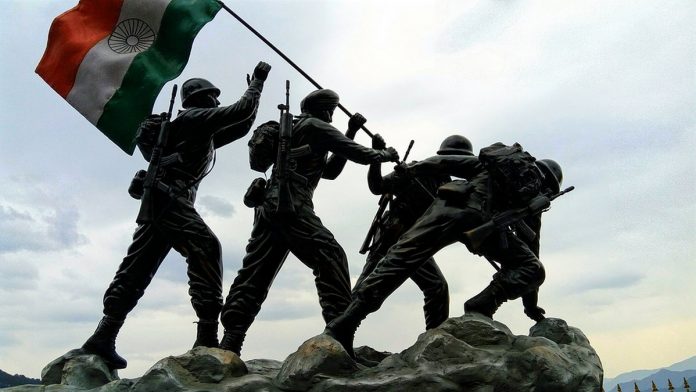ANIT MUKHERJEE
 The Kargil war discredited Islamabad – not just as a revisionist state, but one that was downright dishonest.
The Kargil war discredited Islamabad – not just as a revisionist state, but one that was downright dishonest.
In retrospect, the Battle of Tololing, fought between India and Pakistan during the Kargil war in 1999, was not much of a battle. There were only around 20 casualties, on both sides, and by the morning of 13 June 1999, Indian troops had captured only a few bunkers. Nonetheless, many describe this as a turning point, which changed the course of the war, as the Indian troops thereafter began a month-long ‘ridge-hopping’ campaign.
On the 20th anniversary of this battle, it is worth asking what changed — and did not, in the subcontinent. Ironically, while there is much that India can be proud of but, as revealed by the India-Pakistan crisis earlier this year, it still has a long way to go.
The facts surrounding the Kargil war are well-established now – it was triggered by a territorial incursion by Pakistani military forces in the winter of 1998-99 across the Line of Control. As revealed by Pakistani journalist Nasim Zehra, a small ‘clique of generals’ undertook this plan, codenamed Operation Koh Paima, without wider consultations and by giving “deceptive briefings” to their political leaders. The war began in the summer of 1999 as Indian troops slowly discovered the extent of the incursion. Pakistan maintained that this action was carried out by mujahideen fighters – an outright lie, which amounted to abandoning its soldiers.
The Indian reaction was measured and responsible because it voluntarily forswore the option of crossing the Line of Control. This was also India’s first televised war, with live action reporting juxtaposed with emotionally surcharged funerals. Arguably, it also marked the beginning of a newly discovered cultural nationalism that Bollywood, then as in now, continues to exploit. For an entire generation of Indians, the Kargil war is an event, which is remembered with that common marker of all shared experiences – where were you when.
Apart from its place in India’s national consciousness, the Kargil war was also important for geopolitical reasons. To the surprise of India’s political leaders, the United States, under then-President Bill Clinton, clearly supported India’s position – adding to Pakistan’s diplomatic isolation. The US created conditions for a ceasefire and a face-saving withdrawal by the Pakistani troops, which greatly defused the crisis. The Kargil war did not immediately lead to a transformation in US-India relations, as that would have happened anyway, but it hastened the process.
Perhaps more importantly, the Kargil war discredited Islamabad – not just as a revisionist state, but one that was downright dishonest (even its all-weather friend, China, stayed neutral on Kargil). This perception only strengthened in later years, as the Americans discovered that the Pakistanis indulged in a ‘double game’ in Afghanistan, played a significant role in the 2008 Mumbai attacks and sheltered Osama Bin Laden, among other transgressions. Kargil, therefore, began Pakistan’s slide into its current state of existential and diplomatic ennui.
The Kargil war, inadvertently, led to a transformation in India’s national security structures. In the years preceding the war, members of India’s strategic community were calling for systemic defence reforms, but their arguments found little traction.
However, when the Kargil war was being fought, the government in a bid to mollify public anger announced a committee to investigate lapses. The committee’s report, with minor redactions, was made public and led to the most significant post-Independence transformation of the Indian military and other national security institutions. This episode, however, begs a larger question – do democracies necessarily need crises to push through reforms?
Twenty years later, how should we think of the Kargil war? First, over the last decade or so, India’s strategic community has once again been urging the government to implement the next generation of defence reforms – a call which has gone unanswered. Perhaps the post-Balakot aerial combat earlier this year, which revealed weaknesses in the Indian military, will make Prime Minister Narendra Modi realise the urgency for reforms.
Second, Pakistan had tried to portray (incorrectly) the Kargil war as a part of the Kashmiri struggle for independence. Although it is a false narrative, India has to acknowledge that it has a Kashmir problem which, as the Indian military has repeatedly claimed, requires a political solution. However, beyond an iron fist, the current government does not seem to have a Kashmir policy. Whether Modi can take on these two formidable, but essential, initiatives remains to be seen.
The author is an Assistant Professor at RSIS in Singapore. His new book is The Absent Dialogue: Politicians, Bureaucrats and the Military in India (Oxford University Press, forthcoming). Views are personal.
No comments:
Post a Comment